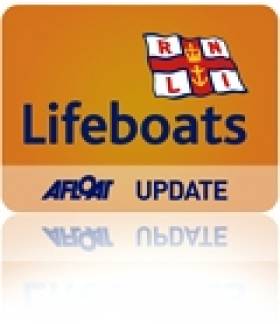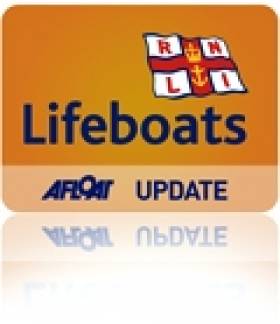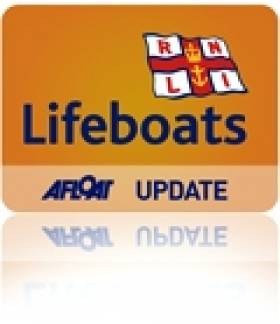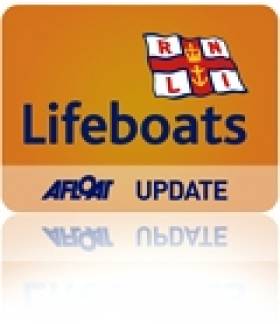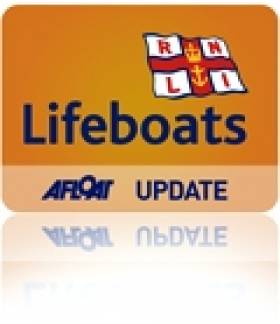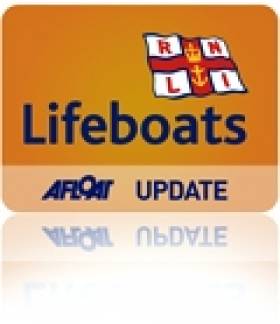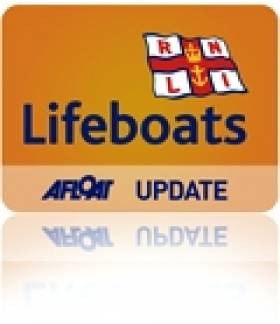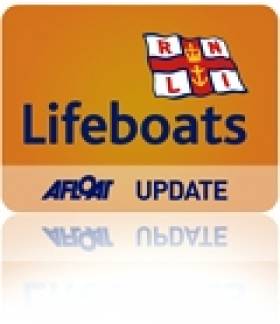Displaying items by tag: Down
Busy Weekend With Four Call-Outs For Portaferry RNLI
#RNLI - Portaferry RNLI in Co Down had a busy weekend with four separate call-outs over the two days.
The first came on Saturday 6 July following a report that three children were drifting offshore on an inflatable toy.
The volunteer lifeboat crew was already afloat on exercise as part of the annual raft race in Kircubbin, Co Down, when they got a call to go to the aid of the three children aged 10, 11 and 14 who were drifting out to sea on the inflatable 18 miles away at Cloughey Bay.
Thankfully by the time they arrived on scene a local coastguard unit had already attended and brought the three children to safety on shore.
Portaferry RNLI was called out for a second time at 4.10pm to rescue a number of people on board a speedboat that had lost power in Strangford Lough just off Killyleagh.
The crew arrived at the scene at 4.15pm, by which time the 15ft speedboat had already been towed in and was moored at the pontoons at Killyleagh Yacht Club in Strangford Lough.
On both occasions the weather was fine with good visibility and calm seas.
Yesterday (7 July) the volunteer crew launched for the third time to assist an injured woman on Salt Island in Strangford Lough.
The crew arrived at the island at 10.10am and assessed the situation before transporting two paramedics from Killyleagh to the injured woman, who was subsequently airlifted by Irish Coast Guard helicopter to Musgrave Park Hospital in Belfast for treatment.
At 11:35am, while returning to the lifeboat station, the crew was alerted once again, this time to go to the aid of two men onboard a five metre Dory that had lost power and was drifting just off Ringhaddy Sound in Strangford Lough.
The crew arrived on the scene at 12.05pm and took the men onboard the lifeboat, towing the powerless boat into Strangford Lough Yacht Club, where the men were then put ashore and their boat tied up.
Elsewhere in Northern Ireland, Newcastle RNLI assisted two men after their motor cruiser ran aground off the Co Down coast last Thursday (4 July).
The volunteer crew launched their inshore lifeboat at 2.20pm following a report from Belfast Coastguard that a small vessel had ran aground off Dundrum Bar with two people on board.
Weather conditions at the time were described as blowing south westerly four to five winds with moderate to choppy seas. There was good visibility.
The lifeboat, helmed by Nathan Leneghan and with crew members Declan Barry and Charles McClelland on board, arrived on scene at 2.30pm, where they observed that one of the men had made it to shore while the other was still on the 5m boat.
Speaking following the call-out, Newcastle RNLI deputy launching authority Joe McClelland said: "Thankfully, no one was in immediate danger and we were happy to bring the vessel and the man who was still on board safely to shore."
Donaghadee RNLI Rescues Man In Boat Breakdown
#RNLI - Donaghadee RNLI has rescued a man after his boat got into difficulty off the Co Down coast.
- In good weather conditions, the volunteer crew launched the all-weather lifeboat at 3.07pm yesterday (Wednesday 26 June) to go to the aid of a casualty off Mew Island.
It followed a request by Belfast Coastguard which had received a call from the owner of the 4m boat to say his vessel had broken down and had starter motor problems.
The lifeboat located the boat north of Mew Island, where it was taken safely under tow by the crew and brought to Donaghadee Harbour.
Earlier in the week, a group of young people from the RNLI Storm Force visited the Donaghadee lifeboat station for a guided tour that emphasised the importance of safety on the water.
The children and their parents were given a warm welcome by coxswain Phillip McNamara and members of the station, who explained the work they do when they respond to emergencies - including getting into their lifeboat gear and jackets in a hurry!
Portaferry RNLI Rescue Two Men In Drifting Dory
#RNLI - Portaferry RNLI launched on Saturday afternoon 15 June to go to the rescue of a small craft which had lost power in Strangford Lough, Co Down.
The volunteer lifeboat crew was alerted at 1.10pm following a call that there was a 5m Dory drifting after its engine had failed.
The lifeboat - helmed by Simon Rogers and with crew members George Toma, Brendan Byers and Ryan Kelly onboard - was launched at 1.20pm and was alongside the stricken vessel just off Gransha Point at 1.34pm.
The weather at the time was a slight swell, light winds and good visibility.
Once alongside, the lifeboat crew found that the Dory was taking on water. The two men were taken onboard the lifeboat and the Dory was towed into Strangford Lough Yacht Club where the men were also left off.
Crash With Turbine Caused Strangford Lough Yacht Dismasting
#RNLI - A collision with a tidal turbine was to blame for the incident that caused the dismasting of a yacht in Strangford Lough on Sunday 9 June.
As reported yesterday on Afloat.ie, Portaferry RNLI's lifeboat crew was dispatched to the stricken yacht in the narrows of Strangford Lough close to the SeaGen water turbine.
The local RNLI press office confirmed that three men and a teenage boy were on board the 37ft yacht at the time - though BBC News says that only three people were rescued, including a child.
The SeaGen installation in Strangford Lough was accredited by Ofgen as Britain's first tidal power plant, as previously reported on Afloat.ie.
#RNLI - Enniskillen RNLI today (10 June) brought four people to safety in two separate incidents on Lough Erne in Co Fermanagh.
In the first call-out of the day, the volunteer lifeboat crew retrieved a man and women from their stranded cruiser which had developed engine problems and run aground on Lower Lough Erne.
The inshore lifeboat Joseph and Mary Hiley and the Rescue Water Craft (RWC) were launched just before 10am at the request of Belfast Coastguard and made the 25-minute, six-mile journey to the casualty's last known position at Crunnish Island. The wind was coming from the south east, force five with good visibility.
On arrival at the scene, the crew noted the casualties had deployed their anchor and there were strong waves hitting the starboard side of the vessel.
The RWC crew member was transferred to the casualty vessel to reassure the crew and to check for any leakage. Another crew member from the lifeboat was transferred to assist with the tow and to lift the anchor.
The lifeboat established a tow and the vessel was refloated and brought to safety at Tudor Farm jetty, close to the initial location.
Less than three hours later, the inshore lifeboat Jason Logg was launched by request of Belfast Coastguard to rescue two people on a broken-down personal water craft on Upper Lough Erne.
The crew proceeded to the casualty's last known whereabouts at the mouth of Tamlagh Bay, four miles downstream from the station towards Enniskillen.
On arrival, the crew found the troubled vessel in the reeds with two people sitting on it. The crew transferred both passengers onto the lifeboat before setting up a tow and bringing the water craft back to Bellanaleck Marina.
Elsewhere in Northern Ireland, Portaferry RNLI brought three men and a teenage boy to safety yesterday afternoon after their yacht got into difficulty off Portaferry in Co Down.
The volunteer lifeboat crew was alerted just after noon following a mayday call that there was a demasted yacht in trouble on Strangford Lough.
The lifeboat was launched minutes later and was alongside the stricken vessel, a 37ft yacht located in the narrows of Strangford Lough, at 12.10pm. Weather at the time was good with clear visibility and a flat calm sea.
One of the four casualties, who had been thrown from the vessel, had been recovered by a fellow crew member and all four were on board the yacht when the lifeboat crew arrived on scene.
Alongside, there was difficulty recovering the vessel so the mast and sail were cut away. Once cut, the lifeboat proceeded to tow the yacht with it crew on board safely back to Strangford where it was tied to a mooring.
Two of the crew were conveyed to hospital while the other two were made comfortable on the shore.
Portaferry RNLI was requested to launch for a second time later this afternoon following a report that a swimmer had gone missing in Newtownards. The lifeboat having launched was subsequently stood down after the missing person was found safe and well.
Koda The Husky Rescued By Quick-Thinking RNLI Crew
#RNLI - Two volunteer crew members from Kinsale RNLI came to the rescue of a husky dog who had a dramatic fall off a cliff near the Co Cork village recently.
Koda, a pedigree husky, was inspecting the coastline around Sandycove when she got too close to the edge and slipped over the 30ft cliff.
The dog landed in water with a strong current that swept her out to sea despite her desperate struggles to reach the shore. She managed to get herself back on a ledge by which time the alarm was raised and volunteer lifeboat crew were on their way.
A jagged reef also meant that Kinsale RNLI’s inshore lifeboat couldn't get close enough to help drag the struggling dog from the water.
However, Kinsale RNLI volunteers Nick Searls and Ian Fitzgerald were at the scene within minutes, and realised the danger facing the terrified dog.
Searles dived into the sea and swam over 60 metres to reach the animal. He managed to attach a harness and was able to swim slowly back to shore, dragging the weakened Koda with him. He was then assisted by safety line out of the sea by Fitzgerald.
Koda was immediately taken to a Kinsale vet, who confirmed that despite being exhausted and shocked by her ordeal, the dog was none the worse for wear.
In other news, Donaghadee RNLI assisted two men on board a yacht which got into difficulty off the Co Down coast yesterday morning (Tuesday 7 May).
The volunteer lifeboat crew was requested to launch at 9.50am by Bangor Coastguard to go to the aid of a yacht which had ran aground.
The 30ft yacht with two people on board had gone aground on rocks at the entrance to Donaghadee Marina.
With the help of another vessel, the lifeboat crew was quickly able to get a tow line to the yacht and pull it off the rocks.
The yacht, which had sustained some damage to its rudder, was able to make its way safely into the marina.
#RNLI - Portaferry RNLI is looking for new volunteer crew members to join its search and rescue service in Co Down.
The station currently has 17 lifeboat and two shore crew to cover its inshore service on Strangford Lough but is now calling on new volunteers to come forward and find out how they can get involved in helping the charity continue to save lives at sea.
To that end, the station will be hosting two open days early next month for all interested candidates to learn more.
"We are looking for anyone aged 17 years and over who is willing to offer some of their free time to join what I believe to be, one of the most exhilarating and rewarding voluntary services that is out there," said lifeboat operations manager Brian Bailie.
"Every volunteer receives first class training from the RNLI and learns new skills which can benefit them in many walks of life. Lifeboat crew members need to have a reasonable level of fitness, have good eyesight and not be colour-blind."
He added: "Anyone who would like to volunteer but feels they would not meet the requirements for lifeboat crew should in no way be put off, as shore crew also play an essential role in the launch and recovery of the lifeboat when it goes on service."
For anyone who feels they have the time and commitment to volunteer for the charity which is on call 24 hours a day, 365 days a year, is asked to email Brian at [email protected].
Alternatively, prospective volunteers can come along to the station’s open days from 7-9pm next Tuesday 7 May or from 2-4pm next Saturday 11 May.
Elsewhere in Northern Ireland, primary school children will have the opportunity to hit the surf with RNLI lifeguards over the next month.
The charity’s ‘Hit the Surf’ programme runs from 7 May to 7 June on the East Strand Beach in Portrush.
Aimed at primary five to seven pupils aged eight to 11, the programme - which is expanding to accommodate more schools this year - gives children a unique opportunity to gain practical lessons in lifesaving and beach safety. All equipment is provided free of charge.
Each session lasts two-and-a half-hours and includes a theory lesson on staying safe at the beach, the role of beach lifeguards and the RNLI, and detailed information on flags and rip currents.
There are practical lessons in lifesaving and surf based skills, while lifeguards aim to build pupils confidence in the sea. Children also learn about the local hazards and the beach environment.
Sessions are still available for schools who want to book pupils in. For more information contact Jessica on 0777 441 4208 or email [email protected]
Last year RNLI lifeguards located on beaches in Co Down and along the Causeway Coast responded to 158 incidents and assisted 176 people who found themselves in difficulty.
RNLI Crews Assist Windsurfer, Stricken Fishing Boat in Co Down
#RNLI - Portaferry RNLI rescued a windsurfer who got into difficulty off the Co Down coast yesterday (16 April).
The volunteer crew launched their inshore lifeboat before 5pm yesterday evening to go the aid of the injured windsurfer reported to be in the area of Pig Island, a small island in Strangford Lough close to Newtownards Sailing Club.
The weather at the time was described as blowing slight to moderate winds with good visibility.
The crew was on scene at 5.15pm where they found the man on Pig Island accompanied by two other men. The windsurfer, who was suffering from a shoulder injury, was transferred to the lifeboat and made comfortable before being taken to the sailing club, where he was then transferred into the care of the coastguard and passed to the ambulance service to be taken to hospital.
Speaking after the rescue, Portaferry RNLI lifeboat operations manager Brian Bailie said: "As the charity that saves lives at sea, we will always respond to any call for help where someone is in danger.
"Strangford Lough is a popular destination for a wide range of water sport enthusiasts and it is important that they take all necessary precautions when using the lough.
"As we are all aware, accidents can and do happen and it is at such times that the work carried out by the volunteer crews of the RNLI is so important."
Elsewhere in Co Down yesterday, Bangor and Donaghadee RNLI assisted a fisherman whose 28ft commercial fishing boat experienced engine failure.
The crew quickly located the disabled boat one mile west of the Copeland Islands at the mouth of Belfast Lough yesterday morning after 11.15am.
With the vessel drifting closer to the island shores and the wind gusting gale force eight, a tow line was quickly rigged and passed to the fishing boat. Bangor RNLI was escorted by Donaghadee RNLI's all-weather lifeboat as it towed the fishing vessel to the safety of Bangor Harbour.
Bangor RNLI volunteer helm Peter Scott, who was involved in this rescue, said: "Engine failure close to shore could lead to a life threatening situation. We always urge everyone going to sea to make sure their electrical systems and engine are well maintained and in good working order. A good anchor and chain should always be carried as part of essential safety equipment.
"We are glad the skipper of this vessel is now safely ashore," he added.



























